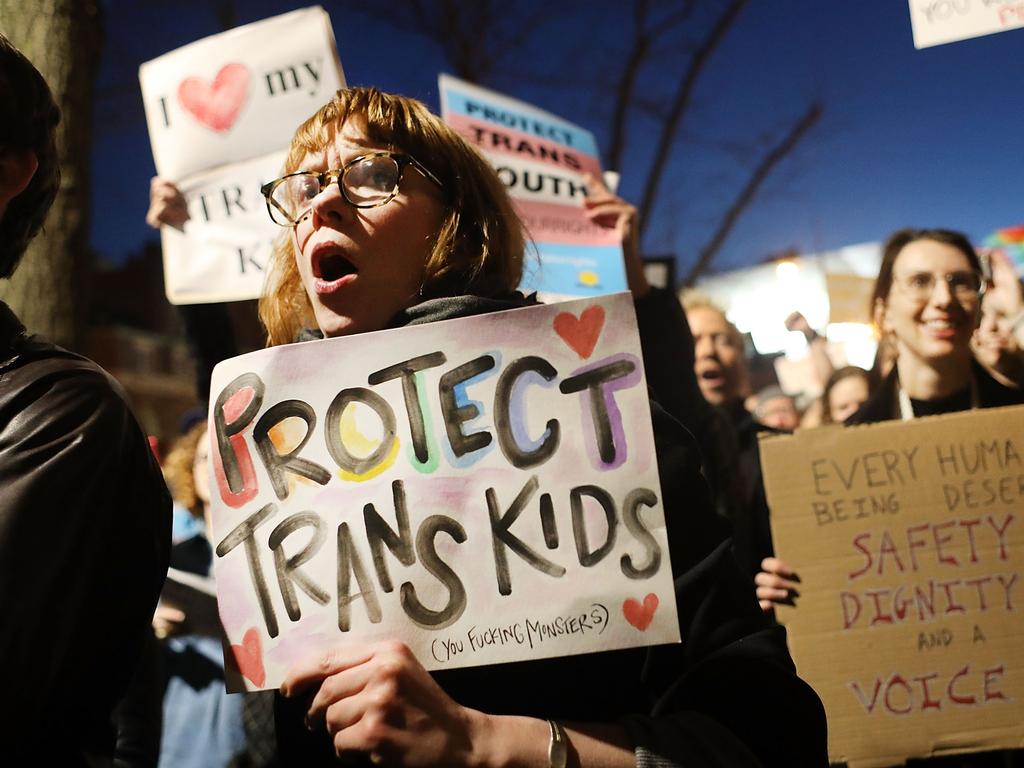Gender clinics on watch for rise in regret over transgender treatment
Youth gender clinics have acknowledged concerns about possible online social contagion driving a surge in teenage trans patients.

Youth gender clinics in Melbourne and London have acknowledged the possibility of online social contagion being a driver of the exponential increase in teenagers identifying as transgender and seeking hormonal treatment.
In a new paper for the Journal of the American Medical Association, researchers who champion “gender affirming” treatment report a link between 2614 positive trans items in mainstream media from 2009-2016 and new referrals to these two clinics one to three weeks later.
They admit “a lack of evidence” to explain the global surge in patients but suggest media coverage may prompt young people to explore “longstanding feelings of gender diversity” and alert them to treatment for gender dysphoria (distress at feeling “born in the wrong body”).
However, the researchers acknowledge the risk highlighted by critics of the gender affirming approach that social media “might act as a double-edged sword or a means of social contagion”, making some young people “erroneously come to believe (their) non-specific emotional or bodily distress is due to gender dysphoria and being (trans)”.
The JAMA paper cites historic low rates of treatment regret among former patients but calls for vigilance “to observe whether regret rates increase in the face of greater media attention and more referrals”.
The British government’s Tavistock clinic has reported a 4400 per cent increase in patients born female from 2008 to 2018, and there has been a 1767 per cent rise in new referrals (55 per cent female) at the Royal Children’s Hospital clinic in Melbourne from 2012 to 2019. Similar trends have been reported in other major cities around the world.
Clinical psychologist Dianna Kenny, a former professor at the University of Sydney and a gender affirming critic, said social contagion was an obvious risk.
“Adolescent social contagion has been pretty well irrefutably established in patterns of marijuana use, eating disorders, non-suicidal self-harm and suicide,” she said.
“The point is that adolescents are very susceptible to social contagion because it’s at that stage of the life span that peer influence becomes extremely important.”
Gender affirming clinicians claim that children as young as three are “experts” in knowing their innermost “gender identity”, even if it’s at odds with their biological sex, and seek to discredit reports of thousands of regretful young adult “detransitioners” internationally who say they were approved for harmful hormones and surgery without proper safeguarding.
Detransitioner Kiera Bell, 23, is taking part in litigation against the Tavistock clinic, claiming staff should have “challenged” her on “the claims that I was making for myself … that would have made a big difference”.
An international letter writing campaign linked to writer JK Rowling’s July 31 birthday urges progressive media outlets “to widen your scope when reporting on gender diversity”, saying they have “substantially ignored” the teenage explosion in gender dysphoria, the role of rigid gender stereotypes, pressures on same-sex attracted youth to conform by changing their bodies, and the plight of the growing number of detransitioners.
In June, most mainstream media led with the celebrity and trans activist backlash to JK Rowling’s 3670-word open letter on sex and gender, failing to report her detailed concerns about the surge of teenagers, mostly girls and many autistic, in gender clinics.
Meanwhile, federal Health Minister Greg Hunt has contradicted RCH gender clinic director Michelle Telfer after she told an international audience he had given his imprimatur to gender affirming treatment.
Mr Hunt told The Australian he had “expressly declined to endorse the current practice” of gender affirming treatment.
Dr Telfer claims Mr Hunt’s backing in a podcast interview with British GP Helen Webberley, who was suspended from practice for giving irreversible opposite-sex hormones to children as young as 12.
Dr Telfer tells her Mr Hunt “has been able to look at the evidence … and has made a statement just in the last fortnight about the benefits of gender-affirming care”.
She appears to be referring to Mr Hunt ruling out a national inquiry into gender clinics in April, following advice from the Royal Australasian College of Physicians that the media attention would be “dangerous”.
That month The Age newspaper claimed the college had “endorsed the affirmation model”. The college would not clarify its position when asked by The Australian.
In May Mr Hunt referred concerns about under-18 gender dysphoria treatment to the Australian Health Ministers’ Advisory Council.
How and when this controversy will be examined is uncertain because it’s not yet clear what will replace the council, which is being wound up as part of the dissolution of the Council of Australian Governments.
The Age has not reported the Hunt referral to AHMAC.
Since speaking up about gender identity theory, I’ve received thousands of emails – more than I’ve ever had on a single subject. Many have come from professionals working in medicine, education and social work. All are concerned about the effects on vulnerable young people. 3/4
— J.K. Rowling (@jk_rowling) July 25, 2020
The JAMA article’s authors include paediatrician Ken Pang, who runs research at the RCH clinic, and Tavistock clinic director Polly Carmichael. They cite two key papers — physician Lisa Littman on “rapid onset gender dysphoria” and psychotherapist Lisa Marchiano on “transgender teens and psychic epidemics” — normally attacked by gender affirming activists as undermining the expertise of young people in self-identifying as trans.
Writing for the Australian Psychological Society, Flinders University academic and queer theorist Damien Riggs has claimed it is “scientifically incorrect” to suggest social media pressure might influence trans identity.
The APS strongly supports the gender affirming model, and argues it might be too restrictive to require mandatory counselling and sign-off by two independent medical practitioners before under-16s are allowed to go ahead with trans surgery such as mastectomy.
The Australian sought comment from RCH, Dr Telfer, Dr Pang, and the Tavistock clinic.







To join the conversation, please log in. Don't have an account? Register
Join the conversation, you are commenting as Logout